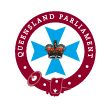-
Work of committees
- Upcoming Committee Business
- About Committees
- Training Seminar - Committees@Work
-
Committees (10)
- Committee of the Legislative Assembly
- Education, Arts and Communities Committee
- Ethics Committee
- Governance, Energy and Finance Committee
- Health, Environment and Innovation Committee
- Justice, Integrity and Community Safety Committee
- Local Government, Small Business and Customer Service Committee
- Parliamentary Crime and Corruption Committee
- Primary Industries and Resources Committee
- State Development, Infrastructure and Works Committee
- Committees Glossary
- Estimates Hearings
- Inquiries
- Live and Archived Broadcasts
- Publications
- Guidelines (4)
- Subscribe
- Former Committees (67)
- 30 Year Release
- Past Alert Digest and Legislation Alert Indexes
- Ten Year Anniversary
Considered: Auditor-General Report 17: 2022-23 - Implementing machinery of government changes
Committee’s consideration
In its Report No.13, 57th Parliament - Annual Report 2023-24, tabled on 27 August 2024, the committee reported on its consideration of a number of Auditor-General's reports referred, including Auditor-General Report 17: 2022-23 - Implementing machinery of government changes. The committee did not resolve to hold further inquiries into these audit reports and made no recommendations to the Legislative Assembly.
OVERVIEW
Role of the Auditor-General
The role of the Auditor-General is to provide parliament with independent assurance of public sector accountability and performance. This is achieved through reporting to parliament on the results of its financial and performance audits and other insights.
About the Auditor-General Report
The Auditor-General’s report to Parliament 17: 2022-23—Implementing machinery of government changes provides insights into central agency leadership during the machinery of government change (the restructure of the functions across government departments) announced on 12 November 2020. The change affected 17 of the core departments and moved 23 functions, with transfers of over 6,200 staff and approximately $8.3 billion in assets.
The report analyses the change management practices of 4 departments that were significantly affected—the Department of Resources, Department of Energy and Public Works, Department of Regional Development, Manufacturing and Water and the Department of Communities, Housing and Digital Economy.
The report also assesses the effect that restructures have on departments’ internal controls (their people, systems, and processes).
Key findings of the report include:
- While an elected government has the right to decide how to organise its executive functions, restructures come at a cost and a subsequent risk that the costs may outweigh the benefits.
- Common risks that need to be consistently assessed relate to:
- changes in senior leadership affecting strategic initiatives and project delivery
- different cultures within individual functions resulting in a lack of cohesion
- internal controls not addressing the risks or meeting the needs of the new department
- issues with the transfer of information between systems and networks
- records not transferring appropriately
- the implementation not being appropriately planned and resourced.
- Central oversight of machinery of government changes is important given that changes affect multiple departments and the implementation is not always the same across entities. This ensures the implementation process is timely and efficient and that equitable decisions are made about the transfer of budget, employees, assets, and systems.
- The Department of the Premier and Cabinet and Queensland Treasury should take lead roles in these restructures by providing guidance to individual departments on key matters such as the measuring of/reporting on how benefits are realised.
- Departments have generally effective internal controls, but those departments that have been impacted by significant machinery of government changes usually have less mature internal controls.
In response to these findings, the report made 7 recommendations and also provides an update on the status of a recommendation made in the QAO’s State entities 2021 report (Report 14: 2021-22).
A number of departments responded to the recommendations made in Report 17. The Public Sector Commission, Queensland Treasury, Department of Energy and Public Works, Department of Housing and Department of Treaty, Aboriginal and Torres Strait Islander Partnerships, Communities and the Arts indicated they agreed with the recommendations relevant to that entity.
The Department of Child Safety, Seniors and Disability Services and the Department of Health raised issues with the recommendation that all departments ensure all information is kept in approved business applications and systems (recommendation 6). The issues raised related to the volume of documents, their retention requirements, and the associated task of digitising these documents. The Department of Health also raised issues with the recommendation that all departments ensure systems are compatible across government and facilitate good recordkeeping (recommendation 7), advising it would require significant investment in ICT and change management, as well as a mechanism to have a lead agency responsible for leading the implementation of the recommendation.
Referral to Committee
Standing Order 194B provides that the Committee of the Legislative Assembly shall, as soon as practicable after a report of the Auditor-General is tabled in the Assembly, refer that report to the relevant portfolio committee(s) for consideration.
The committee is responsible under section 94 of the Parliament of Queensland Act 2001 for assessing the integrity, economy, efficiency and effectiveness of government financial management by examining government financial documents and considering reports of the Auditor-General.
The Legislative Assembly referred this Auditor-General's report to the former Economics and Governance Committee on 24 August 2023. On 13 February 2024, the Legislative Assembly amended Schedule 6 of the Standing Rules and Orders of the Legislative Assembly, establishing the Cost of Living and Economics Committee, and transferred the Auditor-General's report to the Cost of Living and Economics Committee for consideration.
Related Publications
| Publication Details | Type | Published Date | Tabled Date | Committee Name |
|---|
